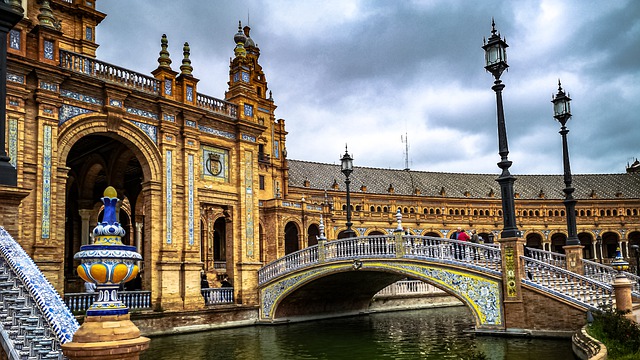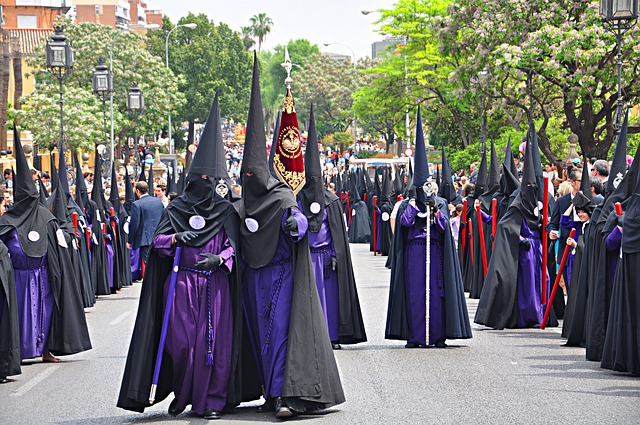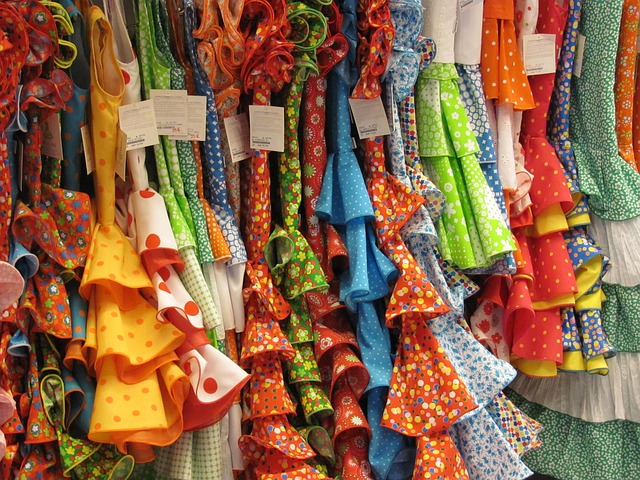Podcast 94 - Towns and Cities - Seville
Today I'm going to talk about towns and cities. This is a B1 session. And this vocabulary is particularly useful for people studying for B1. I will include lots of words and expressions to describe a city. In this case, Seville, which is the city where I live, there will be lots of useful expressions here for you to learn.
Architecture

Seville is the capital of the province of Seville and it's also the capital of a region in the south of Spain called Andalusia. Quite honestly, Seville is an easy place to fall in love with, especially on the surface because it's a very attractive city. It is known to be the city with the largest old quarter in the whole of Europe. So that is the area of city which is the original city and has some remains of the city walls around the outside. It has a lot of traditional architecture, which is very pretty, lovely squares, narrow streets, which are shady and cool in summer.
Opening hours and office hours
First of all, I'd talk about the shops and the opening hours of shops in Seville. Perhaps these opening hours are different from many other cities in Europe. Many shops don't open until half past nine or 10 o'clock in the morning, and then they will close for lunch, too. And re-open at 5:30 in the afternoon and close in the evening at 8pm. However, banks open at eight o'clock in the morning and close at two o'clock or 2:15.
However, office hours are often different and they try to align with the rest of Europe. So for example, many offices will open at nine o'clock in the morning and close at 5:30 or six in the evening. And it's true that Andalusia has a reputation perhaps, or maybe a stereotype, of the Spanish siesta. So with those long lunch breaks, for example, the shops in Seville, what do people do during those long lunch breaks? Do they have a sleep? Do they have a nap? Do they have a siesta, which is a word in the English dictionary now. Well, that perhaps used to be the case but now is less common. People now working in offices get a shorter lunch break and they usually close earlier too. So perhaps the idea of the siesta is more and more a thing of the past.
Transport
Okay, I'm now going to talk about the transport. Seville is like most cities in Europe, it has a lot of cars and there is a traffic problem, but perhaps not quite so much as in other capital cities. It's a smaller city anyway. The population is below a million inhabitants. Seville also has one of the largest amount of cycle lanes. Seville is a very flat city. So that means that cycling is something which is very easy to do, and walking to. Personally, I like to get my cycle and go to work in the morning on my bicycle and come back in the evening on my bike, and I find it quicker and much nicer than taking the car. And anyway in the car you have to pay for car parks, which are usually quite expensive.
Seville also has quite a large airport with flights to all the major cities in Spain, and a lot of the capitals also in Europe - for example: London, Edinburgh, and Paris.
Festivals

Now it's often said about Seville that it's traditional but modern at the same time. And it's true that it has two big events every year. The first one is Semana Santa, or Holy Week. And this is a week when people pour out onto the streets, to watch the pasos, as they're called, or floats with wooden sculptures of Jesus and Mary. These are very beautifully decorated with flowers and it's a very popular event in Seville and all the hotels are usually full up at this time of year.
And then two weeks later, there is a completely different type of festival, which is the April Fair [Feria de abril]. And the April Fair is when they open a lot of these casetas, as they're called, or marquees or large tents. People invite their friends and family to have a drink and talk and to dance the famous sevillanas, which is a typical folklore dance of the region.

The people
One thing that people complain about, tourists for example, when they go to the fair is that although it looks very lively and fun, they don't get invited into these casetas, or tents. And sometimes people make the comment that the Sevillian people, although they seem very happy and jolly and fun, perhaps they're not very hospitable.
I read recently on a couple of blogs on the Internet, a phrase which I hadn't actually heard before. And it said a 'sevillano', which is a person from Seville, 'will invite you to their home, but they won't tell you where they live'. I've been thinking about that. Obviously, they're saying that perhaps the people from Seville are not really very friendly after all. Actually, in Seville, people don't invite friends or family to their homes much anyway. It's much more common to invite somebody out for something to drink and something to eat in a bar or on a terrace, for example, outside or in a restaurant. And people don't have meals in their homes [I mean they don't invite people to their homes for meals], as we do in the UK, for example.
There's another thing as well, which I was thinking about, that when people greet each other in the street, they have a short conversation and if they haven't seen that person for quite a while, they might say, 'we must meet up some time'. And perhaps they don't call you afterwards and you don't call them either. That's not just to people outside Seville, but to everybody.
I suppose one of the things that's true is that a lot of people who live in Seville were actually born here. They went to school here and went to university here. And so they have friends [who] go all the way back to when they were children. Perhaps it's difficult, if you are a foreigner living here in Seville, to get into those circles of friends.
Work and study in Seville
As I live here in Spain. I'm going to talk a little bit about work - what it's like to work here. It's true that the average salary is fairly low at about 1200 euros. However, you do get your Social Security paid for you by your employer and the Social Security system has recently been classed as the seventh best in the world. And talking about Social Security, there is also a well-known hospital here, the Virgen del Rocío, which is known throughout the medical world for its maternity and cancer treatment, and is one of the best training hospitals for nurses and doctors in Spain.
Continuing on the theme of the infrastructure of Seville, I'd like to talk about the university, where I studied for a time when I did my PhD. And it really is a beautiful building. It used to be a tobacco factory, where the tobacco in the 17th century was brought from the Americas and processed. It's now a lively university, where you can study the whole range of science and humanities subjects.
Eating out
Seville has some very beautiful parks. The most well known is perhaps Maria Luisa park, which is like a huge botanical garden with impressive trees and beautiful flowers and lots of shady places to sit down and have a picnic. And near the park, there is the river which runs through the centre of the old part of Seville. The river is called the Guadalquivir and along its banks there are bars and cafes, where you can sit and enjoy a drink and watch the boats go by.
The food in Seville is something quite amazing. Most people, as I've said earlier, spend their free time outside on the terraces of bars and they eat out as well. Tapas or the small snacks are very famous here and they offer a large selection of fish and meat dishes.
One thing I would complain about, I think is that when I've had visitors from the UK, who are vegetarians, they find it very difficult to find food which is vegetarian food for them. It is indeed difficult to be a vegetarian or a vegan in Seville.
The lunchtimes, when you can have something to eat are very long. Bars or restaurants may open about half-past one - and at weekends especially. The kitchen will close at about four o'clock in the afternoon. So the lunch is very long. And a lot of people take advantage to sit outside and enjoy the sunshine.
I've noticed that bars can be very crowded at night, and sometimes it's difficult to find a place to have something to drink or something to eat. And you often find yourself standing up especially in the summer with the tourists as well there, perhaps isn't enough space in the bars for everybody.
Safety
But one thing is nice about Seville which is something which struck me a long time ago that when you have been out for a drink or something to eat and you're walking home, you feel very safe in the streets. There is very little violence in Seville with regards to what we call mugging, which is attacking people in the street to rob them. That is something I feel, and I've seen the statistics, is quite low actually in Seville compared to other major cities in Europe.
The weather
Of course, one of the big subjects about living in the south of Spain, and Seville especially, is the weather. Yes it's glorious weather during the autumn and the winters are mild and it doesn't rain very much. Unfortunately we're going through a drought at the moment, but every day is sunny and it is nice to be out when it's so sunny and spring is delightful. It is lovely to be outside and listen to the birdsong and see the flowers which come out in springtime, both in Seville and the countryside around the city.
But of course the worst time of year is summer, or rather, it's the worst time of year for me because it's so hot! Temperatures get into the 40s. I think the maximum temperature in Seville recorded to date is 47 degrees, which is very, very hot. Most people here... oh, I don't know, most people? But a lot of people here in Seville have a second home on the beach by the sea. And it's quite common for the husband or wife to continue working in the city while their spouse is by the sea with the children, especially during the summer as the summer holidays for schools are very long, about two and a half months. All of July and August is always a holiday period. So people usually prefer to leave Seville during the summer if they can.
So in conclusion, then, what do I think about Seville? Well, I suppose professionally perhaps is not the best place to be in the world, but socially and also for your own peace of mind, it is a lovely place to be because we can enjoy being outside and enjoy the sunshine. It doesn't have the pace and the stress of many other European cities.
Thank you very much for listening. If you would like to find these expressions in written form, please come over to Practising English and have a look at podcast number 94.
Thank you very much. Until next time. Goodbye!
Are you from Seville? Do you agree with everything I say about the city and its people? Is there anything I haven't said? Let me know your opinions...
Copyright © 2023 Practising English
All rights reserved